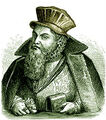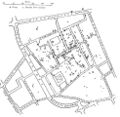Template:Selected anniversaries/November 29: Difference between revisions
No edit summary |
No edit summary |
||
| Line 20: | Line 20: | ||
||1781: The crew of the British slave ship ''Zong'' murders 133 Africans by dumping them into the sea to claim insurance. | ||1781: The crew of the British slave ship ''Zong'' murders 133 Africans by dumping them into the sea to claim insurance. | ||
||1803: Christian Doppler born . | File:Christian Doppler.jpg|link=Christian Doppler (nonfiction)|1803: Physicist and mathematician [[Christian Doppler (nonfiction)|Christian Doppler]] born. Doppler will propose the principle (now known as the Doppler effect) that the observed frequency of a wave depends on the relative speed of the source and the observer. He will use this concept to explain the color of binary stars. | ||
||1825: Jean-Martin Charcot born ... neurologist and professor of anatomical pathology. He is best known today for his work on hypnosis and hysteria ... "the founder of modern neurology". Pic. | ||1825: Jean-Martin Charcot born ... neurologist and professor of anatomical pathology. He is best known today for his work on hypnosis and hysteria ... "the founder of modern neurology". Pic. | ||
Revision as of 02:12, 17 March 2020
1590: Philologist, mathematician, astronomer, and poet Philipp Nicodemus Frischlin dies, killed by a fall in attempting to let himself down from the window of his cell. His prolific and versatile genius produced a great variety of works, but his reckless life and libelous letters led to imprisonment.
1646: Theologian, astronomer, astrologer, and Archbishop of Uppsala Laurentius Paulinus Gothus dies. He wrote numerous theological and astronomical works, and also published calendars.
1693: Mathematician and alleged time-traveller Niles Cartouchian uses Pascaline to detect and prevent an acute outbreak crimes against mathematical constants.
1694: Physician and biologist Marcello Malpighi dies. Malpighi made pioneering contributions to anatomy, histology, physiology, embryology, and microscopy.
1759: Mathematician and theorist Nicolaus I Bernoulli dies. He introduced a successful resolution to the St. Petersburg paradox.
1803: Physicist and mathematician Christian Doppler born. Doppler will propose the principle (now known as the Doppler effect) that the observed frequency of a wave depends on the relative speed of the source and the observer. He will use this concept to explain the color of binary stars.
1849: Electrical engineer and physicist John Ambrose Fleming born. He will invent the thermionic valve, also known as the vacuum tube.
1877: Thomas Edison demonstrates his phonograph for the first time.
1878: Allegedly haunted London cholera map stolen by alleged supervillain Abomynous; crime analysts forecast wave of cholera-related bank robberies.
1904: In a tour-de-force demonstration of thermionic diode technology, engineer and inventor John Ambrose Fleming delivers a lecture from within an experimental Fleming valve.
1918: Writer Madeleine L'Engle born. She will write the Newbery Medal-winning A Wrinkle in Time and its sequels.
1924: Composer Giacomo Puccini dies. He is remembered as "the greatest composer of Italian opera after Verdi".
1955: The EBR-1 in Arco, Idaho suffers a partial meltdown during a coolant flow test.
2010: Computer scientist and physicist Maurice Wilkes dies. He pioneered several important developments in computing, including microcode, symbolic labels, macros, subroutine libraries, and timesharing.
2017: Dennis Paulson of Mars wins award for Best Reality TV Show.














